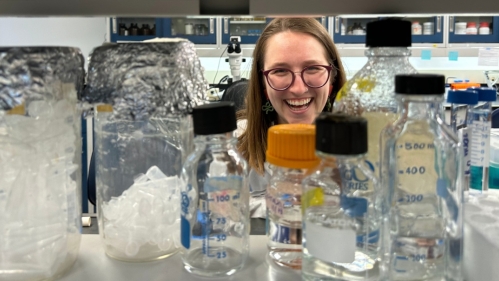Biologist Awarded $240K NSF Fellowship to Study Honeypot Ant Microbes at Rutgers-Newark

SASN Researcher Charlotte Francoeur has won a National Science Foundation (NSF) Post-Doctoral Research Fellowship in Biology to study the microbial activity of honeypot ants living in different locales across the globe.
The fellowship is funded at $240K over three years and will support primary research, lab supplies, living expenses and educational outreach.
Francoeur, of the Department of Earth & Environmental Science (EES) received her Ph.D. in Microbiology from the University of Wisconsin-Madison in 2022.
She is conducting her research under the faculty supervision (and in the lab) of Assistant Professor Lily Khadempour, who studies microbial ecology and insect-microbial symbiosis as part of the Ecology and Evolution research in the department.
"I’m very grateful for NSF’s support of this research,” said Francoeur.
Francoeur’s project rests on a concept known as convergent evolution, which describes when animals, who have many strategies for overcoming challenges in nature, share a similar solution to a problem despite their differences and environments.
An example of this is how animals tackle nutritional challenges. To do so, animals often team up with microbes such as bacteria and fungi, which supplement the animal’s diet with essential nutrients or help them digest tough foods.
Francoeur’s research will investigate if the same microbes are present across a group of convergently-evolved honeypot ants, with a specific focus on the species Myrmecocystus spp. (North America), Tapinolepis trimenii (South Africa), and Camponotus inflatus (Australia), as well as any other lineages that collaborators in the International Consortium of Honeypot Ant Researchers can obtain.
These ant species, along with more than a dozen others, according to Francoeur, all live in arid regions with dry and wet seasons and share a strategy for living in these desert-like environments that rests on specialized division of labor: All honeypot ant colonies have a specialized caste of workers called repletes, which store food in their abdomen—sometimes swelling up to the size of a marble with all the food they store—and can provide food for the entire ant colony during the dry season, when food is in short supply.
Francour will characterize the composition (who is there?) and function (what are they doing?) of the microbiomes of different honeypot ants, which will result in a deeper understanding of the impacts of evolution and division of labor on microbial communities, and vice-versa. And since all animals associate with microbes in some way, these results could be generalizable beyond ants, she says.
“We chose this system because honeypot ants have a lot of interesting behaviors in how their microbes organize themselves and function,” said Francoeur. “By examining how the ants interact with microbes and how these microbes also impact their hosts across geographically distinct species and environments, we’ll try to detect patterns, see if any of our findings apply to mammalian species, and hopefully be able to contribute to evolutionary theory.”
Francoeur must identify which microbes are dominating the ants’ systems and distinguish between those that stick around and contribute nutritional and digestive function to them—such as sterilizing their internal environments so the food that the storage ants carry doesn’t go bad—and those that are simply passively existing or are expelled from the ants’ gut.
“There are all these exciting things about the system host–microbe relationships, and as we learn more, we’ll be growing our catalog documenting which microbes associate with which hosts,” said Francoeur. ‘It's exciting to discover the diversity of microbes around the world and what’s possible for contributing to their study. I’m fascinated by what they can do, and studying honeypot ants is a cool context in which to ask these questions.”
To help with her research, Francoeur will draw on the experience of researchers around the world, especially those who are in close proximity to the honeypot ants she’s studying, all of whom belong to an international honeypot ant group that Khadempour put together.
As part of the NSF grant, Francoeur will also continue mentoring undergraduate and graduate students on not only honeypot ants but also fruit flies, lanternflies, dragonflies and other species that Khadempour studies in her lab. And she’ll be helping Khadempour establish an Ant Visitor Center, likely with NJIT researchers, where students and the public can see and learn about live ant colonies.
Francoeur looks forward to seeing that come to fruition and is grateful for all the support she has received.
“The visitor center is in process and is an exciting part of this grant, since it’s a gateway for the public to interact with these ants and get a sense of our research” said Francoeur. “Meanwhile, I have so many people to thank for their support, including Lily (Khadempour), the NSF, and my colleagues here at RU-N, along with researcher Michele Lanan at the University of Arizona, who has been extremely helpful and supportive.”


